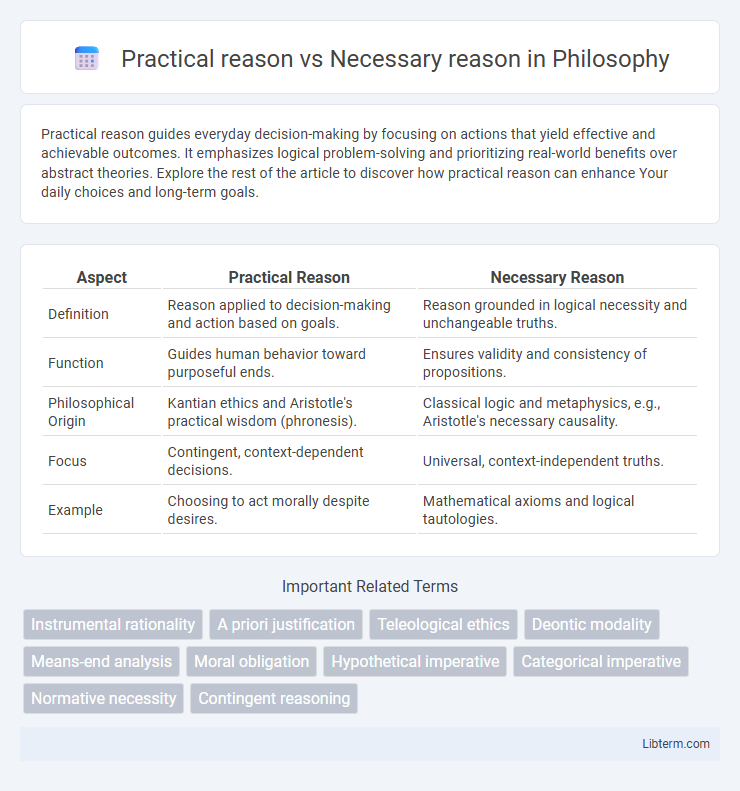Practical reason guides everyday decision-making by focusing on actions that yield effective and achievable outcomes. It emphasizes logical problem-solving and prioritizing real-world benefits over abstract theories. Explore the rest of the article to discover how practical reason can enhance Your daily choices and long-term goals.
Table of Comparison
| Aspect | Practical Reason | Necessary Reason |
|---|---|---|
| Definition | Reason applied to decision-making and action based on goals. | Reason grounded in logical necessity and unchangeable truths. |
| Function | Guides human behavior toward purposeful ends. | Ensures validity and consistency of propositions. |
| Philosophical Origin | Kantian ethics and Aristotle's practical wisdom (phronesis). | Classical logic and metaphysics, e.g., Aristotle's necessary causality. |
| Focus | Contingent, context-dependent decisions. | Universal, context-independent truths. |
| Example | Choosing to act morally despite desires. | Mathematical axioms and logical tautologies. |
Understanding Practical Reason: A Semantic Overview
Understanding practical reason involves grasping how individuals apply rationality to make decisions based on goals, values, and real-world constraints, distinguishing it from necessary reason, which pertains to logical or causal necessity. Practical reason emphasizes deliberation about actions contingent on context and preferences rather than absolute truths, involving normative judgments about what one ought to do. This concept is central to ethics and decision theory, providing frameworks for evaluating choices grounded in human purposes and situational factors.
Defining Necessary Reason: Key Concepts
Necessary reason refers to a cause or explanation that must be true for a particular event or fact to occur, providing an essential condition without which the outcome cannot happen. It is distinguished from practical reason, which involves agents' deliberation and decision-making based on goals, values, or desires. Key concepts defining necessary reason include indispensability, logical entailment, and the absence of alternatives, establishing it as a foundational element in causal and metaphysical explanations.
Core Differences Between Practical and Necessary Reasons
Practical reasons are motivations that guide actions based on desires, goals, or preferences, reflecting what an agent ought to do to achieve a particular end. Necessary reasons, by contrast, are objective justifications grounded in logical or moral principles that mandate certain actions regardless of personal desires. The core difference lies in practical reasons being contingent and subjective centers of motivation, whereas necessary reasons provide unconditional, normative grounds for action.
Philosophical Foundations of Practical Reason
Practical reason involves the capacity to deliberate and make decisions based on values and goals, fundamental to human agency and ethics. Necessary reason, contrastingly, refers to logical or metaphysical necessity that dictates outcomes independent of human volition. The philosophical foundations of practical reason emphasize its role in guiding action, linking moral principles with decision-making processes rooted in autonomy and rational evaluation.
The Nature of Necessity in Rational Justification
The nature of necessity in rational justification centers on the absolute, unalterable grounds that bind a conclusion logically, distinguishing it from practical reasons rooted in contingent, subjective aims and desires. Necessary reason entails conditions that must be met to avoid contradiction and ensure the coherence of rational beliefs or actions, emphasizing objective validity beyond individual preferences. Practical reason, while influenced by necessities of rational will, remains flexible and context-dependent, reflecting purposive choices rather than metaphysical inevitabilities.
Practical Reason in Everyday Decision-Making
Practical reason plays a crucial role in everyday decision-making by guiding individuals to choose actions based on their goals, values, and situational context, rather than relying solely on abstract or necessary reasons grounded in logic or necessity. This form of reasoning evaluates options through a pragmatic lens, emphasizing what is feasible and beneficial in real-life scenarios. Understanding practical reason enhances decision-making processes by aligning actions with personal intentions and environmental constraints, ensuring choices are both effective and meaningful.
Necessary Reason in Logical Arguments
Necessary reason in logical arguments refers to a condition or premise that must be true for the conclusion to hold, establishing a mandatory link between cause and effect. This type of reason excludes alternatives, ensuring that without this specific factor, the outcome cannot occur, thus strengthening deductive validity. Recognizing necessary reasons is crucial in constructing sound arguments, as it guarantees that conclusions are not just possible but logically inevitable given the premises.
Interplay Between Practicality and Necessity
Practical reason guides decision-making based on achievable outcomes and situational appropriateness, while necessary reason relies on logical inevitability or factual constraints. The interplay between practicality and necessity often shapes ethical judgments and problem-solving strategies, balancing what must be done with what can feasibly occur. This dynamic ensures that actions are both rationally justified and pragmatically viable within given circumstances.
Implications for Moral and Ethical Reasoning
Practical reason involves deliberation aimed at identifying actions that fulfill desires or goals, emphasizing flexibility and context in moral decision-making. Necessary reason, grounded in logical or metaphysical necessity, provides universal principles that impose strict ethical duties independent of individual preferences. The tension between practical and necessary reason shapes moral reasoning by balancing contextual judgment with adherence to invariant ethical norms, influencing debates on moral relativism and absolutism.
Practical vs. Necessary Reason: Real-World Examples
Practical reason guides decision-making based on goals, desires, or anticipated outcomes, such as choosing a career path to achieve financial stability. Necessary reason depends on logical or causal necessity, exemplified by mathematical proofs or physical laws that determine outcomes regardless of personal preference. Real-world scenarios highlight this contrast when a business invests in marketing strategies (practical reason) versus abiding by regulatory compliance (necessary reason) to ensure legal operation.
Practical reason Infographic

 libterm.com
libterm.com